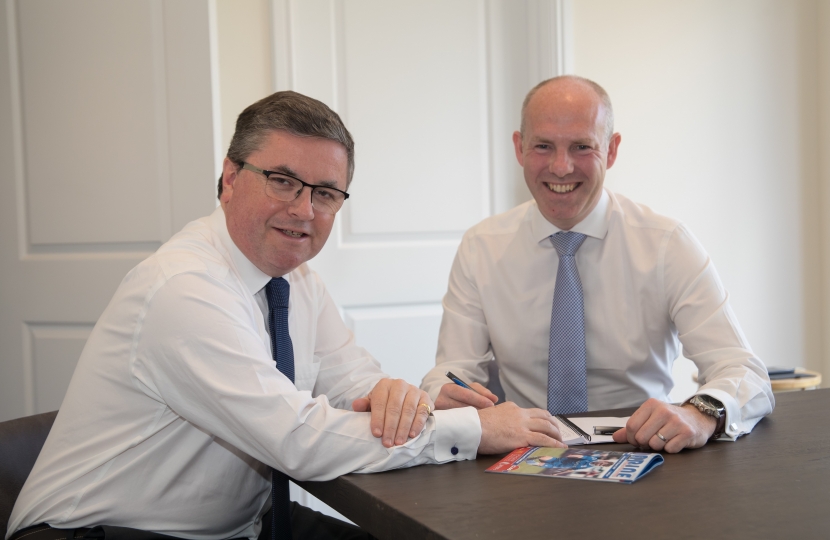
- Around two million of the UK’s lowest-paid workers have benefited from the Conservative Government’s increase to the National Living Wage and National Minimum Wage.
- The National Living Wage has risen by 2.2 per cent to £8.91 this year, and has been expanded to cover 23 and 24-year-olds for the first time.
- 186,000 workers across the South West will receive a pay rise through the increase to the National Living Wage, with 30,000 people also benefiting from the increase to the National Minimum Wage.
216,000 workers in the South West have received a pay increase this year thanks to increases to the National Living Wage and National Minimum Wage brought in by the Conservative Government.
The rate rises include a 2.2 per cent increase in the National Living Wage to £8.91, the equivalent of more than £345 extra per year for someone working full-time.
And for the first time since it came into effect in 2016, more younger people will be eligible for the National Living Wage, as the age threshold will be lowered from 25 to 23 years old.
The rise means someone working full time on the National Living Wage from April 2021 will be taking home £5,400 more annually than they were in 2010.
The Conservative Government remains committed to the target of the National Living Wage reaching two-thirds of median earnings by 2024, and this increase allows progress to continue to be made towards it.
Other rate increases include:
o A 2.0 per cent increase for 21-22 year olds, from £8.20 to £8.36 an hour.
o A 1.7 per cent increase for 18-20 year olds, from £6.45 to £6.56 an hour.
o A 1.5 per cent increase for under 18 year olds, from £4.55 to £4.62 an hour.
o A 3.6 per cent increase to the Apprenticeship Wage, from £4.15 to £4.30 an hour.
These pay increases builds on the unprecedented support the Conservative Government has delivered to protect jobs and livelihoods through the pandemic, including protecting 11.2 million jobs through the furlough scheme, £18.9 billion to support 2.7 million self-employed workers to date, and billions of pounds in tax deferrals and grants for businesses.
Last month’s Budget also introduced new measures to cut down on the cost of living by freezing fuel duty for the eleventh consecutive year - saving an average car driver £12.84 per tank and a cumulative £1,600, and freezing all alcohol duties, saving drinkers £1.7 billion.
Swindon MPs Justin Tomlinson and Robert Buckland said:
“This has been an extraordinarily difficult year for workers across Swindon, but as we recover from the pandemic, this Conservative Government is determined to put more money into the pockets of our lowest-paid workers.
“These increases to the National Living and Minimum Wages will benefit around 216,000 people across the South West, giving them a much needed pay rise as we steadily reopen the economy and get more people back to work.
“This will help to protect the lowest paid and put more money in the pockets of hard-working families – supporting our recovery as we build back better from this pandemic.”
Prime Minister Boris Johnson said:
“The National Minimum and Living Wages have increased every year since they were introduced, supporting the lowest paid, and despite the challenges we’ve faced recently, this year will be no different.
“That’s why we’re providing a well-earned pay rise to two million people, which will be a welcome boost to families right across the UK.
“To make sure the next generation isn’t left behind, everyone over 23 years old will also now be eligible.”
Business Secretary Kwasi Kwarteng said:
“In this toughest of years, we’re protecting workers by putting more money in the pockets of the UK’s lowest paid.
“To support our next generation of workers, we’ve also lowered the age threshold for the Living Wage to 23 - ensuring even more people have the security of a decent wage.
“This increase will help millions of families in every corner of the country, while supporting businesses as we prepare to safely reopen our economy and build back better from the pandemic.
“I’d urge all workers to check their pay packet to ensure they’re getting what they are entitled to, and remind employers of their duty to pay the correct wage.”
ENDS
Notes to Editors
• Increasing the National Living Wage to £8.91 an hour, supporting hard-working families through this difficult time. This is a 2.2 per cent increase in the NLW, above inflation and the equivalent of £345 extra per year for someone working full time. This increase strikes the right balance between supporting the living standards of the lowest paid, while ensuring businesses can thrive as the country continues to recover from Covid-19.
• Expanding eligibility for the National Living Wage, meaning more people can benefit from a high wage. For the first time, more younger people will be eligible for the National Living Wage, as we have lowered the age threshold from 25 to 23.
• Boosting the National Minimum Wage for all under 23 year olds, ensuring everyone can benefit from a decent wage. These increases include:
o A 2.0 per cent increase for 21-22 year olds, from £8.20 to £8.36 an hour.
o A 1.7 per cent increase for 18-20 year olds, from £6.45 to £6.56 an hour.
o A 1.5 per cent increase for under 18 year olds, from £4.55 to £4.62 an hour.
o A 3.6 per cent increase to the Apprenticeship Wage, from £4.15 to £4.30 an hour.
• Increasing the wages of the lowest paid by £5,400 over the last decade, putting more money in the pockets of hard-working families. This year’s increase means the annual earnings of a full-time worker on the NLW will have increased by around £5,400 more annually than they would have been on in 2010.
• Maintaining our target to raise the National Living Wage to two-thirds of median earning by 2024, protecting the living standards of the lowest paid. We remain committed to delivering on our manifesto commitment to increase the National Living Wage to two-thirds of median earnings by 2024, and today’s increase allows progress to continue to be made towards it.
• Cutting the cost of living for UK workers, helping people to keep more of the money they earn. Last month’s Budget introduced new measures to cut down on the cost of living by freezing fuel duty for the eleventh consecutive year – saving an average car driver £12.84 per tank and a cumulative £1,600, and freezing all alcohol duties, saving drinkers £1.7 billion.
• The Resolution Foundation have said our National Living Wage has been one of the key factors in driving down low pay. ‘While low pay on this measure had been in decline since 2013, it was the introduction of the National Living Wage (NLW) in 2016, increasing the minimum wage for workers aged 25 and over from £6.70 to £7.20, that drove the biggest annual fall in low pay since the late 1970s’.




